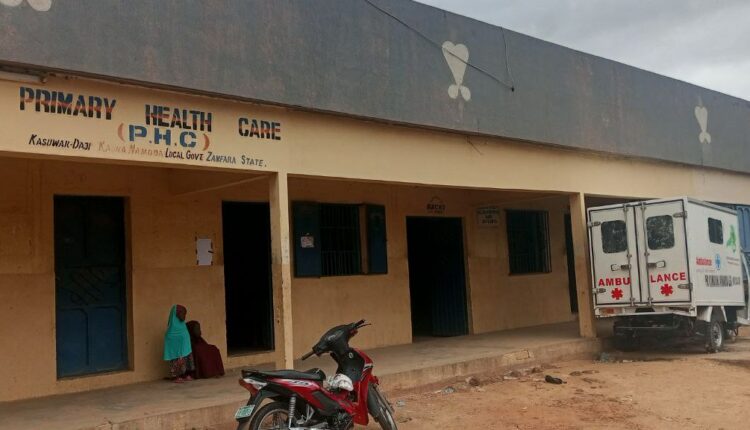In Zamfara State, widespread insecurity and a chronically underfunded healthcare system have created a dire situation for residents.
In this report, SOLACEBASE Correspondent, James Ojo delves into the challenges faced by communities in Bungudu, Tsafe, and Kauran Namoda local government areas, where the poor access to quality healthcare exposes individuals to vulnerabilities including disease outbreaks, exacerbating the already precarious conditions caused by insecurity in the region.
From the hustling and bustling of traders across its cities to booming farming activities, Zamfara used to be one of the pristine destinations for tourists and others visiting the northwestern part of Nigeria.
But not anymore.
In recent years, rising insecurity in the state has made it a dreadful place for residents and investors. Zamfara is one of the most terrorized states in Nigeria. In November last year, the United Kingdom advised its citizens against traveling to the state and others facing insecurity.
The Zamfara Conflict Resolution Concern Forum (ZCRC) also recently asked President Bola Tinubu to declare a “state of emergency” in the state due to the lingering insecurity.
“We categorically state that the people of Zamfara cannot continue to live and die under the dictates of killers, kidnappers, rapists, and sundry criminal groups that have deprived us of our rights to live in peace and security,” the group said.
Hunger, Illness, and Neglect: Insecurity Displaces Families, Drives Residents into Poverty
The story of Sadiya Hassan, a 28-year-old mother of two, typifies that of a failed system and a failed government. After a grueling day selling firewood, she struggled with sleeplessness, a throbbing headache, and a rising temperature. The prospect of seeking medical attention at a nearby PHC crossed her mind, but financial constraints made her quash the idea.
Sadiya resides in an abandoned building that serves as a temporary settlement for over 100 Internally Displaced Persons (IDPs) in Yan Doto, Tsafe Local Government Area (LGA). Sadiya and her fellow IDPs were once flourishing in farming, trade, and other activities in their respective communities. However, the onslaught of bandits shattered their lives, leaving behind a trail of blood, tears, and pain.
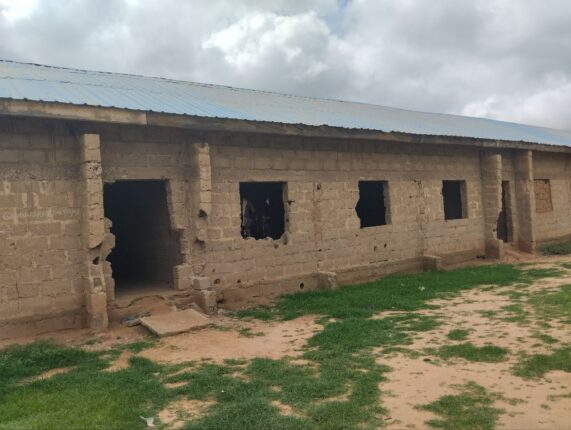
IDP camp in Yandoto, Tsafe LGA.
“My village is among 10 others that have been destroyed by bandits in Tsafe. Some of those affected include Hirji, Shemori, Damame, Hura Huta, Gora, and Gidan Dawa,” she said.
Their escape from the bandits’ clutches was only the beginning of their struggle. In the IDP camp, they faced a relentless enemy: hunger, abject poverty, and ailments.
Sadiya expressed the hardship that plagues the camp, saying, “We are battling to find food for ourselves and our children. I’ve endured countless nights with ailments like malaria, headaches, and abdominal pain, but I disregard my health because we have nothing.”
Sadiya is not alone. Hauwa’u is one of those in the IDP camp struggling with what to eat as well as access to good health care. The 63-year-old has been living in the camp with her children and grandchildren for about five years without any assistance.
“We are experiencing serious hunger, and some women here are exhausted. Some of us here, if you conduct a test on us, you will discover we have high blood pressure. We are suffering,” she lamented.
“On the issue of our health, whenever we fall sick, nobody looks after us except God. We try to find some change like N100 and take it to the chemist here who helps us with medicines such as paracetamol and malaria drugs that we and our children take to treat ourselves.
“When we have stomach pains, pregnancy complications, or childbirth issues, we usually go to Alhaji Mahi (a local health official) to help and save us from the condition. We have not had any doctor to give us any treatment for a long time. For over five years now, we have been suffering. At times, what we eat is sugarcane. That is what we eat and give our children too.”
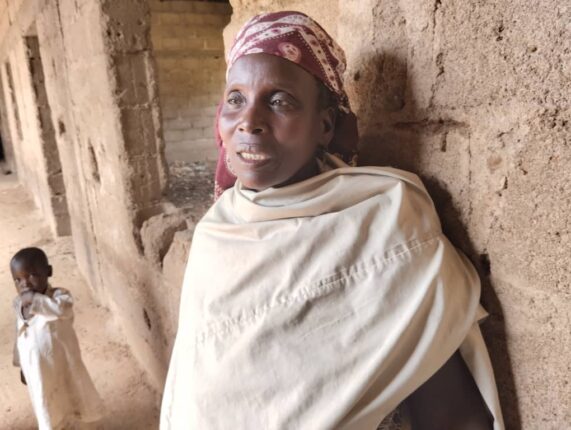
Hauwa’u
The insecurity in Zamfara State has driven many residents into poverty and taken a toll on the health system. In its 2022 Multidimensional Poverty Index, the National Bureau of Statistics (NBS) ranked Zamfara as one of the poorest states in the country, with 78 percent of people living in poverty.
Amina Muhammad, a staff member at Nahuce Primary Health Center (PHC) in Bungudu LGA, shed light on a distressing reality. She explained that a significant number of women in the village neglect their health due to the pervasive poverty in the area, further exacerbated by the prevailing insecurity.
“Many women in the village struggle to afford basic healthcare, especially pregnant women. They are in desperate need of assistance to access medical services,” she lamented. Amina continued, “Some women experience a shortage of blood during childbirth and are unable to cover the cost. In such dire circumstances, we often have to pool money together to save their lives.”
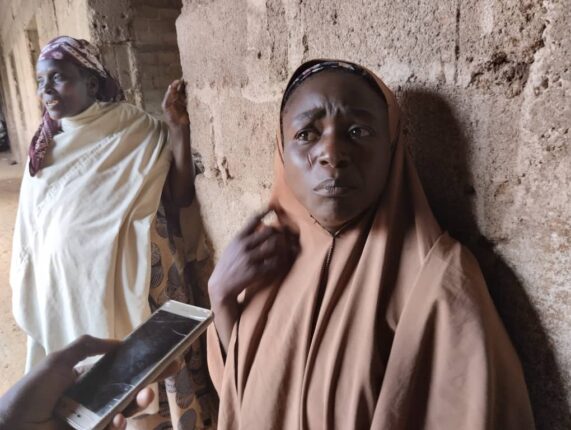
Sadiya Hassan
Inadequate personnel, moribund PHCs…inside Zamfara’s struggling health sector
It was a dark day for Abdulsalam Sarki Aski; one that would linger for years. In August 2023, the resident of Magazu community in Tsafe local government area (LGA) of Zamfara state woke up as usual in the early hours of the day, fetched his cutlass, and headed to the farm for the day’s business.
But upon his return, he got the shock of his life. Safiyya Rabiu, his sister, had passed on. The late Safiyya was a mother of six and was pregnant with her seventh child when she breathed her last. She died with the baby.
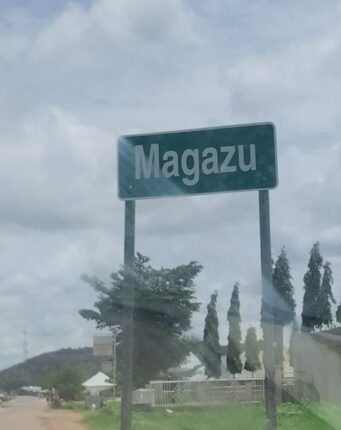
With teary eyes, he recalled the circumstances that led to his sister’s death. Before Safiyya’s tragic passing, she was rushed to Model Primary Health Centre in Magazu in Tsafe LGA where she was first attended to.
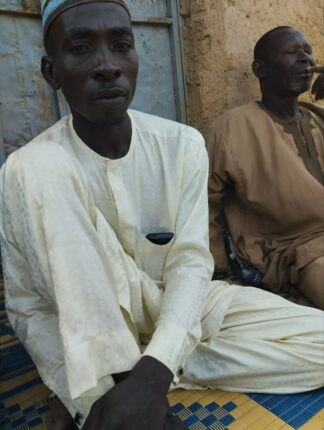
Abdulsalam Sarki Aski
“On the day I returned from the farm, I was told my sister was rushed to the Model Primary Health Centre in Magazu for treatment. The officials attended to her at first. But after a while, she was told she needed blood to facilitate the remaining treatment,” he said.
“They told her there was no blood bank to respond to a medical emergency. At this point, they referred her to Tsafe General Hospital, which is several kilometers away, for medical attention.
‘Unfortunately, she could not come back alive. She died shortly after she arrived at Tsafe General Hospital. My sister died in pain due to lack of blood bank at the Magazu PHC.”
Abdusalam said her condition, however, worsened after some hours and required blood to facilitate the treatment. To Safiyya’s surprise, the medical officials told her there was no available blood bank to handle emergency response.
He said Safiyya was then referred to Tsafe General Hospital, which is several kilometers away for medical attention. Safiyya did not make it thereafter. She passed on shortly after arriving at the general hospital.
“I went to the farm, and when I came back, I was told she visited the hospital. Unfortunately, she could not come back alive,” he told SOLACEBASE.
The facility, Abdulsalam said, lacked a blood bank for emergency response. Safiyya’s husband, who would have probably saved the day, was nowhere in sight.
“My sister died in pain because of insufficient blood at the hospital,” Abdulsalam added.
Like Abdulsalam, Masa’uda, sister to the late Safiyya, was livid by the circumstances that led to her death. She had a genuine reason to be. With a functional facility, late Safiyya stood a chance of survival.
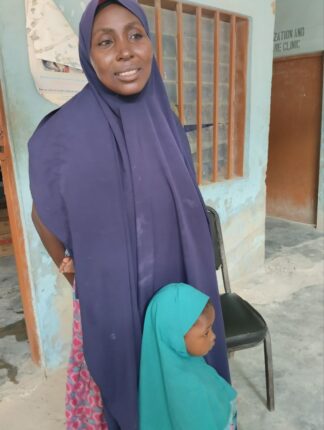
Masa’uda, sister to the late Safiyya
Regrettably, the Model Primary Health Centre in Magazu, once a beacon of hope for the community, has seen brighter days but now languishes in a state of neglect. Its decrepit state is unmistakable, with roofs that threaten to collapse and laboratories ill-equipped to meet even the most basic medical needs. When SOLACEBASE visited the health facility on August 9, 2023, the stark reality of its dilapidation was impossible to ignore.
In the face of this dire situation, many residents have no other option but to embark on a challenging journey to Tsafe General Hospital. Even though it’s miles away, they are willing to trek long and arduous paths.
“Sometimes, it’s a three-kilometer journey on foot just to access essential healthcare,” Masa’uda lamented, vividly recalling how her sister’s life was tragically affected by these challenging circumstances.
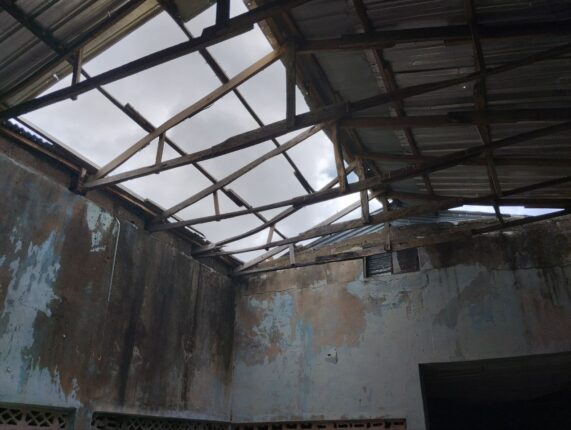
A blown-off roof at Magazu PHC, Tsafe LGA.
Hassana Iro, another resident of the community, is approaching her expected delivery date but Safiya’s death and the lamentable state of the only Primary Health Centre (PHC) in the community have turned what should be an exciting experience into a dreadful ordeal.
On a daily basis, Hassana, who is now seven months pregnant, finds herself clinging to the hope of a smooth delivery.
She said, “This is the reality we face here. Despite my condition, there are times when I must trek several miles just to access proper healthcare. Not too long ago, I needed an ultrasound. Due to the dire condition of the PHC, I had to make the journey to Tsafe General Hospital and back to obtain the results. The expenses are becoming overwhelmingly burdensome. It is as if we don’t have leaders. It is unfair that the government has abandoned the masses. We are in dire need of help.”
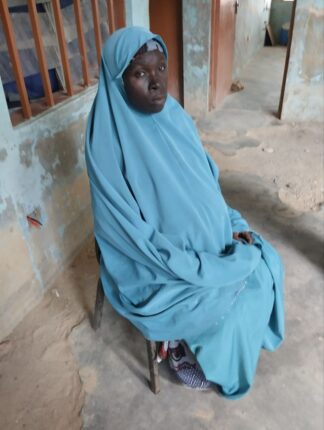
Hassana at Magazu PHC, she’s pregnant with her seventh child.
Infant and maternal mortalities in Zamfara are a scary reality. As of 2021, the child mortality rate in the state stood at 136 deaths per 1,000 births – an increase from 130 deaths per 1,000 live births in 2018 – according to the Multiple Indicator Cluster Survey (MICS) of the NBS.
Safiyya and Hassana’s experiences provide just a glimpse of the daunting challenges associated with accessing healthcare in Zamfara.
Hamza Umar, the officer-in-charge (OIC) of Magazu PHC, was forthright when this reporter inquired about the issues facing the facility. His expression was grave, and it was evident that he didn’t know where to start from due to the enormity of the challenges.
“As you can see,” he began, “the building is on the verge of collapse, and many structures here are in a state of disrepair. This facility serves over 40 villages, yet we’ve been without electricity for over two years. Out of the 25 beds provided to the facility, only five are currently functional. These challenges, particularly in the area of maternity care, is a substantial obstacle for us.”
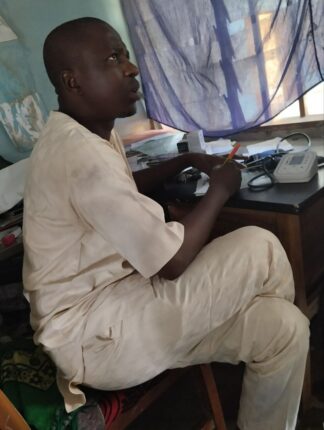
Hamza Umar, officer-in-charge of Magazu PHC at his office.
The situation in Bungudu Local Government Area (LGA) mirrors that of Magazu. When SOLACEBASE visited Gada Primary Healthcare, located just 6km away from Bungudu local government secretariat, it became abundantly clear that the facility was in dire need of a comprehensive overhaul.
Lawalli Dan Sule, the officer-in-charge of Gada PHC, said the lack of experienced medical personnel has taken a toll on its operation and ability to respond to the health needs of residents.
Sule recalled a cholera outbreak in 2022 in Ruggar Tudu and Turkud’u villages in the LGA, which he said, affected about 23 people.
“It was even some concerned citizens that helped with some drugs and water during the outbreak. At the time, only I and another official were on the ground to attend to the patients due to the staff shortage,” he said.
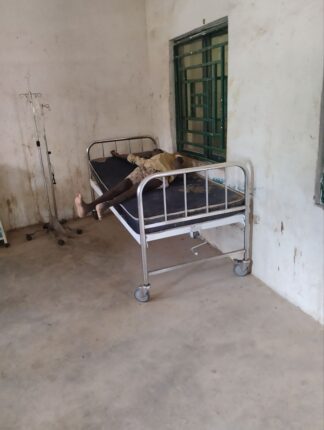
A patient in need of medical attention at a PHC in Gada, Bungudu LGA.
At Bungudu General Hospital, residents reported that only one permanent resident doctor is available, and they claimed this doctor often closes the facility early in the day. When the reporter visited the hospital, a frustrated man who had brought a patient was seen waiting for hours without any doctor’s attention.
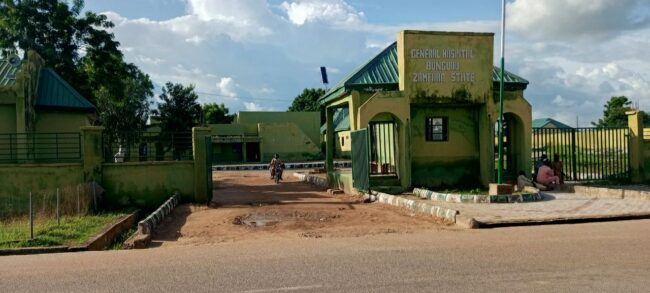
“We have no other options; that’s why we’re here. People prefer traveling to the state capital for healthcare rather than coming here because of the staff’s negligence,” the man stated, his anger evident.
Bungudu General Hospital serves over 20 communities in the LGA, but the severe shortage of staff and poor service delivery have eroded residents’ trust in the facility, particularly for emergency cases. Other health centers visited in Tsafe LGA also exhibited a lack of adequate infrastructure and personnel to function optimally.
Zamfara is the worst state in Nigeria to be a citizen in need of healthcare, according to a report by ONE Campaign, in partnership with National Advocates for Health, Nigeria Health Watch, Public and Private Development Centre (PPDC), and other partners.
The report, titled “the State of PHC Services in Nigeria (2019-2021)”, revealed that Zamfara is the worst-performing state in Nigeria in terms of healthcare delivery.
In spite of this, budget allocation to the health sector in the state has been shrinking after the coronavirus pandemic. Since 2020, budgetary allocation to the health sector in the state has been reduced. In 2020, for instance, the state budgeted N15.66 billion for the health sector. This, however, reduced to N12.98 billion in 2021 and N11.21 billion in 2022 respectively.
The decrease in budgetary allocation to the healthcare sector has led to underfunded Primary Health Centers (PHCs), resulting in a shortage of staff, essential drugs, and facilities for residents in need of healthcare. This has also weakened the state’s capacity to respond effectively to epidemics.
Safety First: How insecurity is worsening healthcare delivery in Zamfara
Bungudu General Hospital is usually packed with activities, particularly on Mondays. But the reverse is the case nowadays. This is not unconnected to the rising insecurity in the area.
“Mondays are usually our busiest day during the week. After the morning review session, we usually have our reception full of patients. But as you can see, not a single person is waiting for us,” an official at the facility told SOLACEBASE.
Residents say activities of bandits and gunmen across communities in the LGA have increased in recent times. The situation, it is understood, has forced many away from visiting hospitals for fear of being kidnapped or killed.
Mairo Sani, a resident of one of the villages in the LGA, was vocal about his frustration. “It is about safety now,” he said.
“There is fear of being attacked as we heard even the police that are protecting people were attacked and killed by bandits. If that’s the case, what then happens to the citizens?”.
In July 2023, bandits killed four policemen at a checkpoint along Gusau-Bungudu road in a midnight attack. In the same month, suspected gunmen killed Ahmad Kotorkoshi, a member of the Nigerian Bar Association (NBA) at his residence in Bungudu LGA.
Keku, Bingi, and Gada villages are now plagued by insecurity. These once peaceful areas have transformed into hotbeds for terrorists who operate with minimal restriction.
In Gada village, which is just a 6km journey from the local government secretariat, medical officials were reluctant to work due to frequent attacks in the area.
Sule, the officer in charge of Gada PHC, shared a harrowing account of a woman in labor in one of the nearby villages. Tragically, she could not be transported to the hospital and was left to endure excruciating pain due to the very real fear of being killed on her way to seek medical assistance.
During this reporter’s visit to Bungudu Local Government Area (LGA), numerous villages, including Dambar Alhaji, Sukudin Yamma, Karakkai, and Rukkaiwa, were deemed inaccessible due to ongoing security threats.
In Nahuce village, which is also located in Bungudu LGA, insecurity remains a significant concern for residents in need of medical attention. Nursing mothers defy these challenges and make the arduous journey to Nahuce PHC to access the state government and United Nations Children’s Fund (UNICEF)-initiated milk support.
Sanusi Rufai Nahuce, who has been working at the PHC for 20 years now, narrated how two women were kidnapped on their way to the facility last year
Nahuce reported that although the attacks seemed to have lessened, many still struggle to visit the hospital due to lingering fears. In Kauran Namoda Local Government Area (LGA), this newspaper discovered that insecurity posed a significant threat to accessing healthcare. Residents expressed their inability to sleep soundly at night.
Abubakar Aliyu, a staff at Kuryar Madaro PHC in the LGA, disclosed that the community and neighboring villages had been grappling with security threats for several months. He stated, “We live in constant fear of attacks day and night. We’ve made complaints, but nothing has been done. As staff here, we don’t feel safe. At times, we risk our lives to enter those villages and treat those with gunshot injuries resulting from bandit attacks. Just recently, about 14 people were kidnapped.”
He continued, “You can see how women gather here; they arrive as early as possible to finish their work swiftly and return to their homes, all because of the activities of these bandits.”
Ma’inna, a resident of Alku Village in Kaura Namoda LGA, highlighted how pervasive insecurity has hindered health officials from visiting the area. Residents are compelled to remain confined within their homes, irrespective of the health challenges they confront.
“We don’t have a Primary Health Center (PHC) in our village or any nearby community, and we are in desperate need of help,” Ma’inna pleaded. She further revealed, “Bandits recently kidnapped 15 people in this village. Look at my grandchild; there’s no access to a balanced diet, and he is suffering from severe malnutrition.”
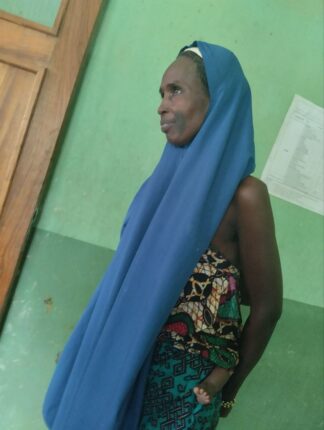
Ma’inna
Mamuda Bature, 46, said the insecurity in the area has been on for over five years, adding the development has denied her and others access to good healthcare.
“The situation is disheartening. The situation is getting out of control,” Mamuda added.
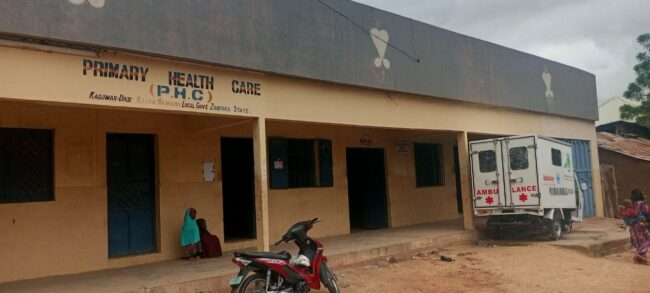
A PHC at Kasuwar-Daji village, Kaura Namoda LGA.
In Shinkafi LGA, the situation is dire. Many villages in the LGA have become inaccessible due to bandit activities. This reporter was discouraged from visiting the area due to the security situation. A staff member at Shinkafi Primary Health Care, who requested anonymity for safety reasons, stated that there are approximately 40 PHCs in the LGA, but seven of them have come under terrorist attacks and are currently inaccessible.
“Transportation is also a concern: commercial motorcyclists (Okada riders) can’t access certain areas now because bandits seize any motorcycles they come across,” the official explained. Furthermore, the official emphasized that due to the inaccessibility of these areas, responding to disease outbreaks has become almost impossible.
‘We’re helpless, urgent intervention needed to tackle insecurity and improve healthcare’ – community leaders speak
Like residents, community leaders are bearing the brunt of the insecurity in several parts of Zamfara state as several pleas to the government yielded no significant improvement.
Labaran Abdullahi, the village head of Magazu in Tsafe LGA, said due to incessant attacks around his community, many of them cannot sleep with their eyes closed anymore.
He also decried the state of health facilities in Magazu and called on the government for urgent intervention.
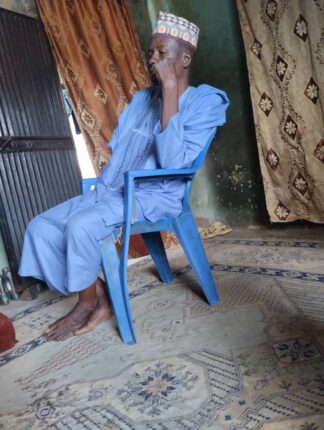
Labaran Abdullahi, the village head of Magazu in Tsafe LGA
“We have recorded numerous complaints about the inability of some communities to access healthcare due to one reason or the other. As a leader, I am helpless to be honest. Several other district heads are frustrated with the situation. It is sad when people in your community find it difficult to access healthcare due to the raging insecurity and the poor condition of our health facilities,” he said.
“We hope the government will do everything possible to restore lasting peace, especially in some communities that are no longer accessible because of insecurity. I could remember there was a time when villagers did not even have the guts to travel to step out of their houses, not to talk of visiting hospitals for check-ups. It was that bad.
“But we hope this ends so that people will sleep with their two eyes closed again.”
Wakili Mamman, a community leader in Gada Village in Bungudu LGA, said that while medical officials are “doing their best,” many residents of the village and nearby ones such as Hayin Gulbi and Yar Tunga no longer visit the facility for fear of being killed.
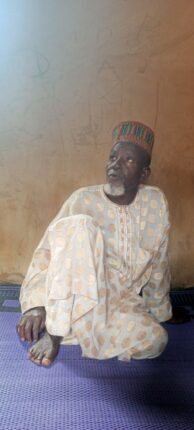
Wakili Mamman in Bungudu LGA.
On August 6, 2023, he recounted an incident where bandits stormed a nearby village, kidnapping several residents and rustling an unspecified number of people during the attack.
“All we care about now is the safety of our people. A lot of us cannot take the risk of visiting hospitals due to fear of being killed or kidnapped on the way. You can only access healthcare when you are alive,” he said.
At Alku Village, Kaura Namoda LGA, Ibrahim Aminu, a community leader, said many residents of his community live in constant fear of attacks from bandits at night.
“It is a sad situation that we don’t have peace of mind here. Nobody knows what is going to happen the next minute, the government should come to our aid,” he said.
Government keeps mum
Efforts to get comments from the state government regarding the findings of this report were unsuccessful. Aliyu Maradun, the Permanent Secretary of the Zamfara Ministry of Health, was initially contacted for a response.
This reporter first tried to reach Maradun on August 22, but the permanent secretary said he was not in town.
A few weeks later, on October 10, this reporter called Maradun again. This time, Maradun answered the call and promised to respond, saying that he was driving at the moment and would get back to this reporter in a few minutes.
However, Maradun did not follow up or respond to a text message from this reporter on the matter. He also did not respond to further text message reminders on October 13 and 21.
Efforts to reach Aminu Lawal Gusau, the spokesperson for the Zamfara State Primary Health Care Board, on October 10, 2023, proved abortive. Text messages sent and calls made to Gusau’s known phone number was greeted with silence.
A reminder sent to Gusau on October 13, 2023, didn’t get any response. Meanwhile, Gusau replied to another reminder sent to him on October 21, 2023. In his response, Gusau asked what the reporter wanted. The reporter restated his inquiry, but Gusau did not respond.
The silence from the state authorities leaves critical questions and concerns unanswered.
This SOLACEBASE publication is produced with support from the Wole Soyinka Centre for Investigative Journalism (WSCIJ) under the collaborative Media Engagement for Development, Inclusion, and Accountability Project (CMEDIA) funded by the MacArthur Foundation.

